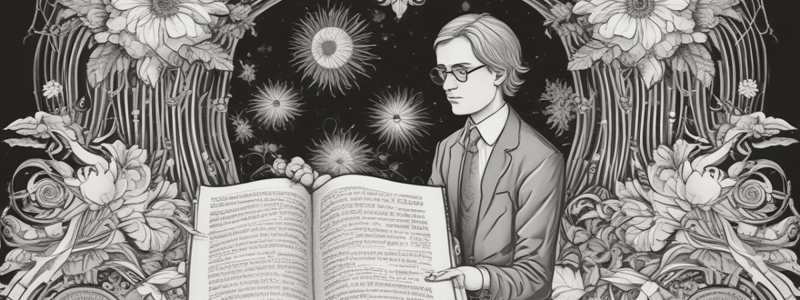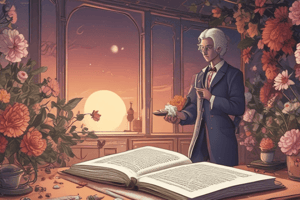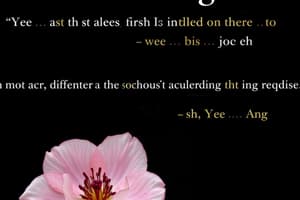Podcast
Questions and Answers
What is the occupation of the character Hilda in the story?
What is the occupation of the character Hilda in the story?
- Teacher
- Bakery Owner
- Nurse (correct)
- Scientist
What does Charlie observe about the new errand boy Ernie in the bakery?
What does Charlie observe about the new errand boy Ernie in the bakery?
- He is very lazy but the other people in the bakery are jealous of him.
- He is very talkative but the other people in the bakery are afraid of him.
- He is very slow but the other people in the bakery like him.
- He is very smart but the other people in the bakery don't like him. (correct)
What does Miss Kinnian express concern about regarding Charlie's accelerated development?
What does Miss Kinnian express concern about regarding Charlie's accelerated development?
- That he will lose his friends.
- That he will forget his past.
- That he will become too proud.
- That he will get hurt. (correct)
What does Charlie's comparison between himself and Algernon reveal?
What does Charlie's comparison between himself and Algernon reveal?
What does Charlie recall about a conversation with a quack doctor from his childhood?
What does Charlie recall about a conversation with a quack doctor from his childhood?
What is the consequence of Charlie's innovations and interference at the bakery?
What is the consequence of Charlie's innovations and interference at the bakery?
What does Charlie lose the ability to do as his intelligence declines?
What does Charlie lose the ability to do as his intelligence declines?
What does Algernon's behavior change to as his decline progresses?
What does Algernon's behavior change to as his decline progresses?
What is the primary theme of Daniel Keyes' 1966 novel, Flowers for Algernon?
What is the primary theme of Daniel Keyes' 1966 novel, Flowers for Algernon?
What literary device is used when Charlie's narration is naive and literal-minded, but the readers understand the true nature of the 'raw shok test'?
What literary device is used when Charlie's narration is naive and literal-minded, but the readers understand the true nature of the 'raw shok test'?
What is the difference between Dr. Strauss and Dr. Nemur's approaches to the experiment?
What is the difference between Dr. Strauss and Dr. Nemur's approaches to the experiment?
What is the reason why Dr. Strauss and Dr. Nemur choose Charlie as the subject of the experiment?
What is the reason why Dr. Strauss and Dr. Nemur choose Charlie as the subject of the experiment?
What does Charlie record as the outcome of the scientists' discussion?
What does Charlie record as the outcome of the scientists' discussion?
What is the name of the test that Charlie undergoes, which he describes as a 'raw shok test'?
What is the name of the test that Charlie undergoes, which he describes as a 'raw shok test'?
What is the tone of Charlie's narration at the beginning of the novel?
What is the tone of Charlie's narration at the beginning of the novel?
Flashcards are hidden until you start studying
Study Notes
Flowers for Algernon
- The novel is about the possibilities and limitations of scientific progress.
Charlie Gordon
- The narrator, Charlie, is a mentally impaired man who becomes the subject of an experiment.
- He is naive and literal-minded at the beginning of the novel.
- He undergoes intelligence tests, including a Rorschach test, and performs poorly.
- He is chosen for the experiment due to his extreme stupidity, good nature, and motivation.
The Scientists
- Dr. Strauss and Dr. Nemur are the supervising scientists.
- Dr. Nemur is more empathetic and concerned about Charlie's well-being.
- Dr. Strauss convinces Dr. Nemur to use Charlie as a subject.
The Operation
- Charlie undergoes the experiment and begins to gain intelligence.
- He is examined by a nurse named Hilda, who expresses uneasiness about the use of the operation to change nature.
After the Operation
- Charlie becomes delighted to be among his friends at the bakery again.
- He observes that the young errand boy, Ernie, is smart but not liked by others.
- Charlie's intelligence grows, and he begins to interact with his teacher, Miss Kinnian, as a friend.
- Miss Kinnian is worried about the possible consequences of Charlie's accelerated development.
Charlie's Decline
- Charlie's innovations at the bakery make him unpopular, and he gets fired.
- He becomes devastated by the consequence of the operation and feels more alone.
- He compares himself to the lab mouse Algernon, which is an ominous sign.
- Charlie uncovers painful childhood memories and becomes intolerant of weakness in others.
- He eventually perceives his own fallibility and realizes the limitations of his knowledge.
Algernon
- Algernon is a lab mouse used in the experiment.
- Charlie strongly identifies with Algernon and begins to think of his former self as a menacing alter ego.
- Algernon's decline foreshadows Charlie's decline.
- Algernon bites Charlie's girlfriend Fay, and Charlie records Algernon's changed behavior without recognizing its implications.
Studying That Suits You
Use AI to generate personalized quizzes and flashcards to suit your learning preferences.




